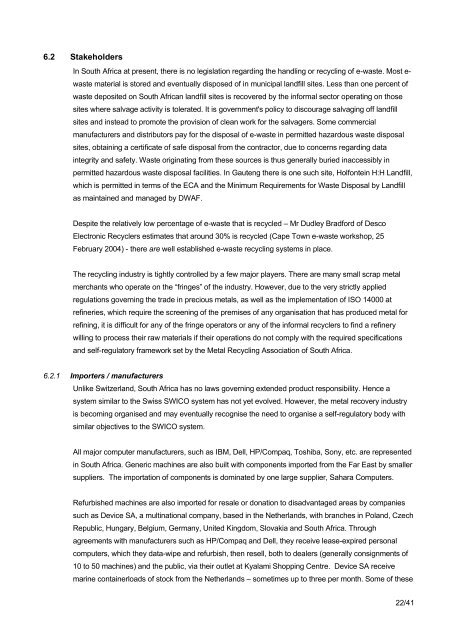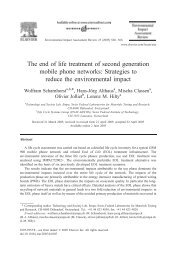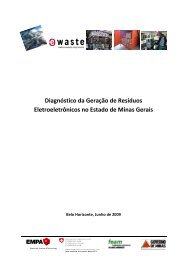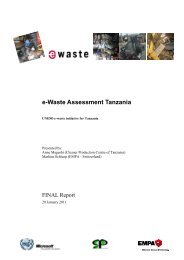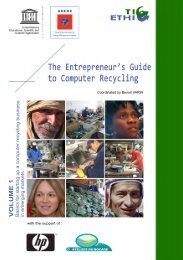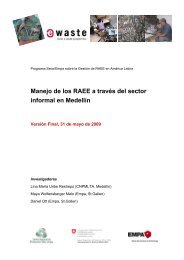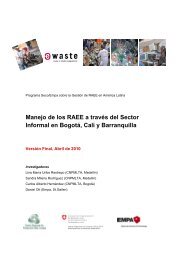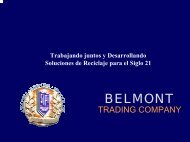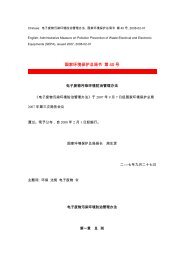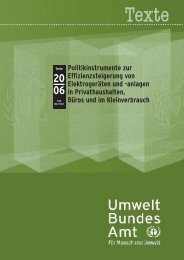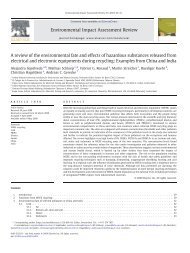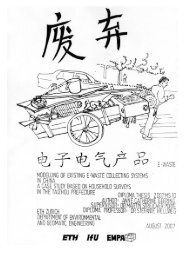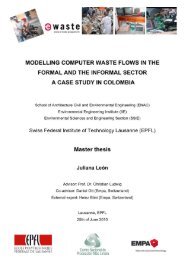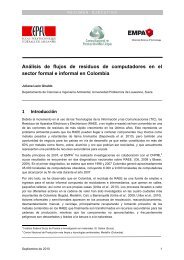E-WASTE ASSESSMENT IN SOUTH AFRICA - e-Waste. This guide
E-WASTE ASSESSMENT IN SOUTH AFRICA - e-Waste. This guide
E-WASTE ASSESSMENT IN SOUTH AFRICA - e-Waste. This guide
You also want an ePaper? Increase the reach of your titles
YUMPU automatically turns print PDFs into web optimized ePapers that Google loves.
6.2 StakeholdersIn South Africa at present, there is no legislation regarding the handling or recycling of e-waste. Most e-waste material is stored and eventually disposed of in municipal landfill sites. Less than one percent ofwaste deposited on South African landfill sites is recovered by the informal sector operating on thosesites where salvage activity is tolerated. It is government's policy to discourage salvaging off landfillsites and instead to promote the provision of clean work for the salvagers. Some commercialmanufacturers and distributors pay for the disposal of e-waste in permitted hazardous waste disposalsites, obtaining a certificate of safe disposal from the contractor, due to concerns regarding dataintegrity and safety. <strong>Waste</strong> originating from these sources is thus generally buried inaccessibly inpermitted hazardous waste disposal facilities. In Gauteng there is one such site, Holfontein H:H Landfill,which is permitted in terms of the ECA and the Minimum Requirements for <strong>Waste</strong> Disposal by Landfillas maintained and managed by DWAF.Despite the relatively low percentage of e-waste that is recycled – Mr Dudley Bradford of DescoElectronic Recyclers estimates that around 30% is recycled (Cape Town e-waste workshop, 25February 2004) - there are well established e-waste recycling systems in place.The recycling industry is tightly controlled by a few major players. There are many small scrap metalmerchants who operate on the “fringes” of the industry. However, due to the very strictly appliedregulations governing the trade in precious metals, as well as the implementation of ISO 14000 atrefineries, which require the screening of the premises of any organisation that has produced metal forrefining, it is difficult for any of the fringe operators or any of the informal recyclers to find a refinerywilling to process their raw materials if their operations do not comply with the required specificationsand self-regulatory framework set by the Metal Recycling Association of South Africa.6.2.1 Importers / manufacturersUnlike Switzerland, South Africa has no laws governing extended product responsibility. Hence asystem similar to the Swiss SWICO system has not yet evolved. However, the metal recovery industryis becoming organised and may eventually recognise the need to organise a self-regulatory body withsimilar objectives to the SWICO system.All major computer manufacturers, such as IBM, Dell, HP/Compaq, Toshiba, Sony, etc. are representedin South Africa. Generic machines are also built with components imported from the Far East by smallersuppliers. The importation of components is dominated by one large supplier, Sahara Computers.Refurbished machines are also imported for resale or donation to disadvantaged areas by companiessuch as Device SA, a multinational company, based in the Netherlands, with branches in Poland, CzechRepublic, Hungary, Belgium, Germany, United Kingdom, Slovakia and South Africa. Throughagreements with manufacturers such as HP/Compaq and Dell, they receive lease-expired personalcomputers, which they data-wipe and refurbish, then resell, both to dealers (generally consignments of10 to 50 machines) and the public, via their outlet at Kyalami Shopping Centre. Device SA receivemarine containerloads of stock from the Netherlands – sometimes up to three per month. Some of these22/41


